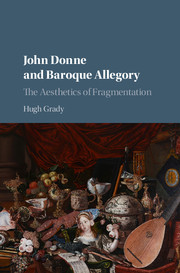Description
John Donne and Baroque Allegory
The Aesthetics of Fragmentation
Author: Grady Hugh
Provides a new appreciation of John Donne through the lens of Walter Benjamin's critical theory of baroque allegory.
Language: EnglishApproximative price 112.78 €
In Print (Delivery period: 14 days).
Add to cart
Publication date: 08-2017
236 p. · 15.8x23.5 cm · Hardback
236 p. · 15.8x23.5 cm · Hardback
Description
/li>Contents
/li>Biography
/li>
John Donne has been one of the most controversial poets in the history of English literature, his complexity and intellectualism provoking both praise and censure. In this major re-assessment of Donne's poetry, Hugh Grady argues that his work can be newly appreciated in our own era through Walter Benjamin's theory of baroque allegory. Providing close readings of The Anniversaries, The Songs and Sonnets, and selected other lyrics, this study reveals Donne as being immersed in the aesthetic of fragmentation that define both the baroque and the postmodernist aesthetics of today. Synthesizing cultural criticism and formalist analysis, Grady illuminates Donne afresh as a great poet for our own historical moment.
1. Walter Benjamin and John Donne: constellations of past and present; 2. The Anniversaries as baroque allegory: mourning, idealization, and the resistance to unity; 3. Donne's The Songs and Sonnets: living in a fragmented world; 4. Allegorical objects and metaphysical conceits: thinking about Donne's tropes with Benjamin; 5. The metaphysics of correspondence or a fragmented world? Baroque poetics in the seventeenth century; 6. Conclusion.
Hugh Grady is Professor Emeritus of English at Arcadia University, Pennsylvania. His published works include The Modernist Shakespeare (1992), Shakespeare, Machiavelli, and Montaigne (2002), and Shakespeare and Impure Aesthetics (Cambridge, 2009). He has also edited four critical anthologies and published a number of articles, most of which have investigated ways in which contemporary critical theory can be applied to works of early modern literature.
© 2024 LAVOISIER S.A.S.
These books may interest you

The Complete Poems of John Donne 160.25 €




